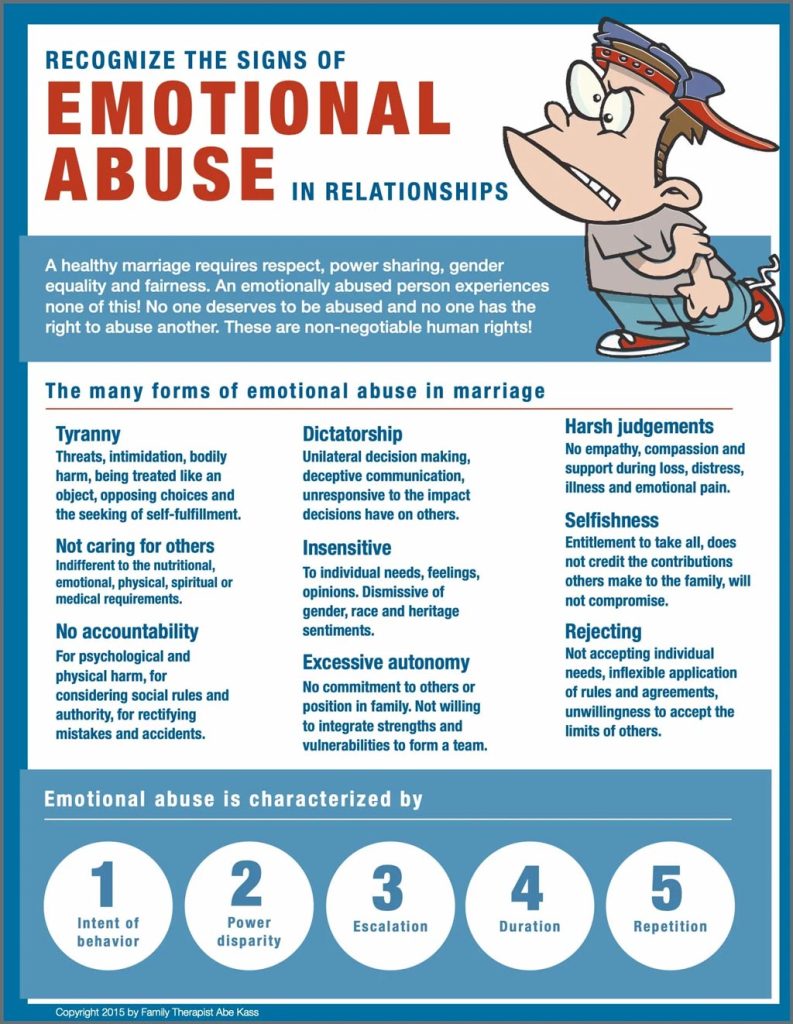

Professional Therapist Abe Kass MA RSW RMFT
Abe has helped thousands of individuals, couples, and families for twenty-five-plus years. When it comes to relationship expertise — Abe is the real deal and can be trusted!
Lisa’s husband is an abuser. Lisa doesn’t want to live in a marriage with emotional abuse. She feels humiliated, put down, and disrespected.
Lisa wants her children to grow up seeing a respectful relationship between their parents so they will also grow up to treat their partners with respect.
However, what they see is their father being angry, insulting, and controlling their mother, and a mother who often cries and seldom smiles.
Lisa wants to know, as do many others, “Do emotional abusers change?”
Lisa is unsure of her future!
Before I answer this question: Can emotional abusers change? I want to explain the difference between a difficult relationship and an emotionally abusive relationship.

The information in the Emotional Abuse Poster was adapted and slightly “modified” by Abe Kass from: THE INTIMATE JUSTICE SCALE: AN INSTRUMENT TO SCREEN FOR PSYCHOLOGICAL ABUSE AND PHYSICAL VIOLENCE IN CLINICAL PRACTICE, By Brian Jory, Ph.D. Journal of Marital and Family Therapy, January 2004, Volume 30, Number 1, 29 – 44. You can read this article here: Wiley Online Library, Journal of Marital and Family Therapy
In a difficult marriage or a difficult committed relationship, fighting is typically about a particular issue.
For example, one partner wants to save money and the other partner wants to buy furniture for the house or one partner wants to spend more time together as a family and the other partner wants to watch sporting events on TV.
In a difficult relationship, the trigger for arguments is differing opinions regarding what to do or what not to do.
Not over WHO is entitled to decide the outcome of a particular issue.
In an emotionally abusive relationship, the trigger for fighting is that one individual is not complying with the other partner’s wishes.
An abusive relationship is characterized by one individual who wants to CONTROL his or her partner, and this includes making all the decisions.
Aggressive anger is typically used to bully and intimidate the target of abuse.
An abuser’s effort to control is true for every type of abuse — emotional abuse, mental abuse, psychological abuse, verbal abuse, physical abuse, or sexual abuse.
Sometimes the emotional abuser can become violent by hitting, pushing, or throwing things to break all resistance in their partner. This is called domestic violence.
If violence occurs in your relationship, you should call the police.
Safety must come first.
If there is violence and you do not respond decisively, you may become seriously injured.
Sadly, many good people have died at the hands of their own partners.
Only when you are safe from being hurt, can you then ask, “Do abusers change?”
You do not have a genuine relationship if you are being assaulted.
If your partner assaults you, you need to get away from him or her.
Wondering, ‘can an emotional abuser change’ when your life is at risk is misplaced. Sadly many victims of abuse make this mistake; don’t be one of them.
Now that you know the difference between a ‘difficult relationship’ and an ’emotionally abusive relationship’, I can answer the question, “Can emotional abusers change?”
The short answer is, that if you suffer from emotional abuse, mental abuse, psychological abuse, verbal abuse, or sexual abuse, it is possible for the offender to stop with the right education and therapy.
An abuser can only be educated or benefit from therapy to stop abuse when he or she has the following 5 character traits:
Without the following 5 character traits, the abuser is showing that he or she is not prepared to replace their abusive behavior of harshness and cruelty with the non-abusive behavior of respect, sensitivity, and kindness.
If an abuser is to change, he or she must be able to recognize his or her abusive behavior.
To do so, the abuser must be able to step away from his or her patterns of behavior and feelings and see clearly what he or she is doing to his or her partner and how wrong it is.
Being objective is a mental skill that can be developed if it does not come naturally.
Being objective means recognizing the abuse. Without this, an abuser cannot change.
The abuser must accept responsibility for his or her behavior.
In other words, an abuser MUST NOT blame his or her partner for the abuse.
Respect is a human right. It does not need to be earned. The victim of abuse is never at fault!
Having abused his or her partner, the abuser must take 100% responsibility for what he or she has done.
Taking responsibility includes having REMORSE for past behavior and a willingness to find ways to prevent the abuse from happening again in the future.
Once responsibility is accepted, then a plan can be made to eliminate patterns of bad behavior and to correct unhealthy relationship beliefs. The first step is being able to identify the signs of emotional abuse.
If there is no acceptance of responsibility, then there will only be blame and avoidance, and no positive change will be possible.
Humility is an essential ingredient if an abuser is to change.
Humility gives the abuser the courage to say,” I am wrong, and I am sorry.”
Humility gives the abuser the opportunity to learn and understand what the abuse has done to his or her partner.
The opposite of humility is arrogance and stubborn defiance. If the abuser has those bad character traits, he or she will never change.
If the abuser commits to make positive changes in his or her behavior, he or she needs the self-discipline to succeed.
Self-discipline ensures that the plan to become a non-abuser stays on course.
On-and-off abuse still equals abuse. This means that the abuse must stop 100%.
Consistent application of the plan is absolutely necessary for the victim of abuse to feel safe and for the relationship to recover. And this can only be achieved when the abuser disciplines himself or herself.
Your abusive partner may have all of the above positive character traits. However, this is not enough if they are not motivated to change.
Your partner also needs to be sufficiently motivated to want to do whatever it takes to stop the abuse.
For example, the emotionally abusive husband, the emotionally abusive wife, or the emotionally abusive partner must want a healthy and happy marriage or committed relationship.
Your partner must be prepared to sacrifice his or her wants to achieve these relationship goals.
A willingness to sacrifice to achieve the goal of becoming a non-abuser may include self-study, individual therapy, relationship therapy, group therapy, or any other concrete plan to change some deep-rooted beliefs and patterns of behavior.
Successful personal change requires commitment. Commitment requires motivation!
The abuser needs to understand the benefits for himself or herself and all the family members when the abuse has been eliminated.
Without this powerful motivation to be better, the ‘abuser will remain an abuser.’
An emotionally abusive wife, an emotionally abusive husband, or an emotionally abusive partner CAN change
All types of abuse — emotional abuse, mental abuse, psychological abuse, verbal abuse, physical abuse, or sexual abuse — should not be accepted.
You should not allow yourself to be abused.
The best solution is for your partner who abuses you to transform himself or herself into a respectful, cooperative, and considerate person.
If this cannot be done, you should consider ending your relationship with your abuser. However, doing so is not so simple.
Separating from or divorcing your partner has many risks. Especially if you have children. The details regarding all this are beyond the scope of this guide.
Leaving your abusive partner should not be your first choice.
Separation or divorce should be considered only if the abuse is unrelenting and the relationship is beyond repair.
Talk sincerely to your husband, wife, or partner. Try to get him or her to see how his or her abusive ways are wrong and that they need to be replaced with respect, fairness, and kindness.
If your efforts are rejected or lead to continued abuse, get outside help with your partner or alone.
Get help from a qualified relationship specialist or an organization that supports families.
You can find a caring relationship specialist here:
American Association for Marriage and Family Therapy
Canadian Association for Marriage and Family Therapy
Know, that when there is abuse in your home, and the abuser has committed himself or herself to stop abusing, positive change can take time.
Victims of emotional abuse need to be patient and understand this.
Slow and steady progress towards a more respectful and harmonious life together as a husband and wife or committed couple is definitely worth the effort and time needed.
Yes, you CAN eliminate emotional abuse in your relationship; emotional abusers can — and do — change.
Objectivity, responsibility, humility, self-discipline, and motivation are the necessary character traits needed by the abuser to make these necessary positive changes.
Determine if the emotional abuser you know has what it takes to change.
Immediate results, no email required.
0 of 15 Questions completed
Questions:
You have already completed the quiz before. Hence you can not start it again.
Quiz is loading…
You must sign in or sign up to start the quiz.
You must first complete the following:
Time has elapsed
You have reached 0 of 0 point(s), (0)
Earned Point(s): 0 of 0, (0)
0 Essay(s) Pending (Possible Point(s): 0)
30 points. Yes, your partner is ready to stop all abuse and change for the better.
Based on your quiz results, it seems like your partner has come to understand how wrong abuse is and what he or she needs to do to make amends. You are fortunate!
29 – 24 points. Your abusive partner is on the road to recovery.
The abusive partner needs additional work to have the right attitude and behavior to stop all abuse. He or she should continue to educate and sensitize himself or herself to be more committed to being a non-abuser.
Less than 23 points. The ‘abuser’ has the wrong attitude about abusive behavior, how wrong it is, the damage it causes, and will likely continue the abuse in the future. The fewer points your abusive partner received under ’23 points,’ the less likely he or she is ready to change for the better.
Likely your abusive partner needs professional help to stop his or her harmful ways. Personal and relationship therapy, anger management, honesty, sensitivity training, spiritual commitment, and education about relationships will all likely help this person get ‘real’ about what he or she has done or is still doing.
Emotional abuse causes a ‘sexless marriage or committed relationship’ that can kill all love and intimacy.
Anger is the primary tool used to emotionally abuse another. Anger has many ways of expressing itself. Watch as a husband bullies his wife.
How do you think emotional abuse impacts this marriage? The answer is simple, the husband’s wife wants nothing to do with him… which includes sexual intimacy!

Abe has helped thousands of individuals, couples, and families for twenty-five-plus years. When it comes to relationship expertise — Abe is the real deal and can be trusted!
 Professional Therapist Abe Kass MA RSW RMFT
Professional Therapist Abe Kass MA RSW RMFT
Abe has helped thousands of individuals, couples, and families for twenty-five-plus years. When it comes to relationship expertise — Abe is the real deal and can be trusted!